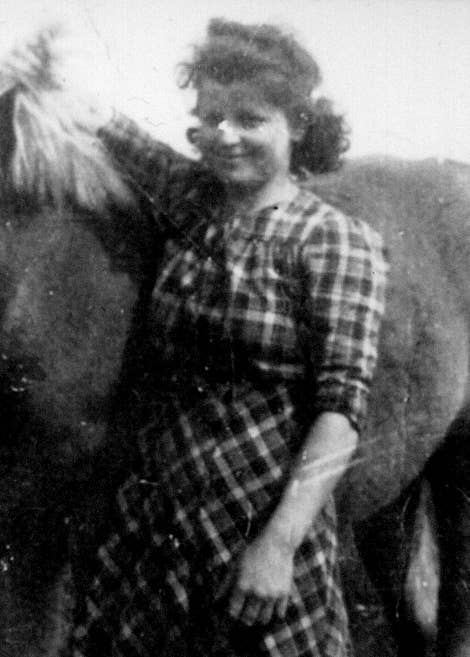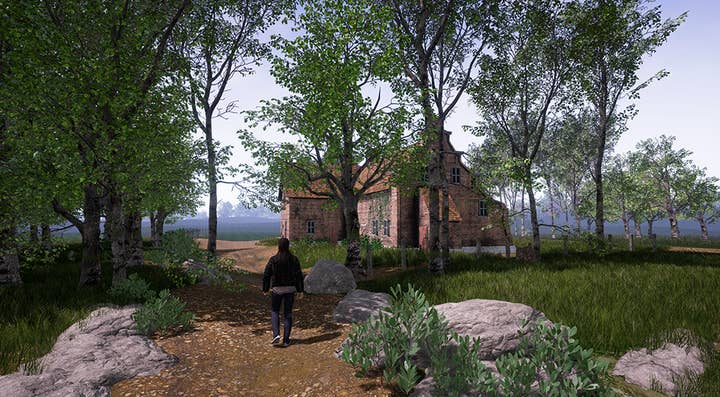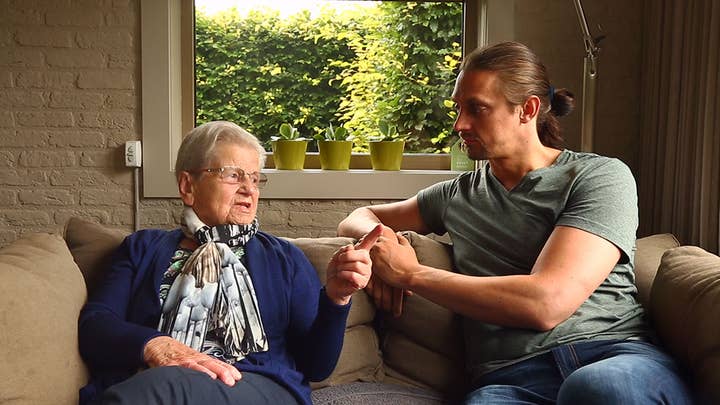Immortalising your grandmother in a WWII game
Bob De Schutter talks us through the inspiration and incredible true stories behind his PC title Brukel
Bie Verlinden is not your typical video game protagonist. For a start, she's 93.
Yet her life is the source of inspiration for Brukel, an indie game set during World War II. Rather than charging into enemy fire or engaging in aerial dogfights, players instead relive the 14 year-old Verlinden's childhood in the titular farmhouse, and the traumatic events that happened there.
At its core the game is a walking simulator, although it veers into horror territory as the story becomes more intense. Players begin by exploring the farmhouse with a smartphone. Taking photos of certain objects or rooms will trigger audio accounts from the 93-year-old Verlinden.
Brukel was developed by Belgian game designer Bob De Schutter, a professor at Miami University and Bie Verlinden's grandson. He's confident it will be unlike any WWII title you have played.

"You can't fight off the Nazi ghosts that you'll experience," he explains. "You have the same ability to deal with a soldier as a 14 year-old girl would.
"A lot of the focus in the beginning of the game is on giving players a lot of control, giving them a smartphone they can use to take pictures of whatever they like. As the game goes on, I take away that control bit-by-bit. There's even a scene where you get possessed by a ghost and take the role of an English officer to kill my grandfather. Because that actually happened; a drunk English officer almost shot my grandfather, and if that had happened I wouldn't be here right now."
This story is just one of many De Schutter's grandmother told him as he grew up. So rich and varied were these tales that, even at a young age, he knew he wanted to package them into something other people could experience. As he developed an interest and eventually a career in game design, he knew this would be how he brought the stories of the Brukel farmhouse to a wider audience.
But, as De Schutter puts it, "life happened." His studies for a PhD, his responsibilities as a professor and the pressure of his day job prevented him from working on this project for years. Fortunately, Miami University insists that its professors on tenure take a sabbatical to work on research or a creative project, and De Schutter was finally able to pursue his dream project.
"You can't fight off the Nazi ghosts that you'll experience. You have the same ability to deal with a soldier as a 14 year-old girl would"
Five years ago he interviewed his grandmother about her life at Brukel -- not necessarily with plans to make the game, but so that he had the stories if he got the chance. With his sabbatical he was able to begin development in earnest.
While there were a few photos of the abandoned farmhouse, De Schutter had no access to blueprints or measurements, so he drew sketches based on his grandmother's descriptions, adapting them with her guidance. These were used to calculate the dimensions of the house for 3D rendering.
De Schutter originally envisaged something simpler, akin to The Sims, but one of his students insisted it would be better in first-person and assisted with the 3D modelling. They even recreated a model of the house using a 3D printer as a birthday present for Verlinden.
Verlinden hasn't actually played the game herself -- "She can't use a gamepad or keyboard" -- but she watched De Schutter and his brother play through, amazed at seeing her childhood home come to life. And key to the entire experience are her audio accounts.
"Her storytelling voice is very dramatic, but she can't act," De Schutter laughs. "I've tried getting her to just say something that would work well with the game, and she can't. It sounds fake. And then you let her tell a real story and it sounds so dramatic, it's the best voice acting in the world.
"This is why I want more developers to try this. There are some very talented voice actors but this is something special -- you really feel how people have actually lived through a story versus acting it out."
There are roughly five hours of recordings between De Schutter and Verlinden, although not everything makes it into the game. The professor shared some of the experiences players won't get to hear about, like his great uncle who was told by soldiers the house had burned down and spent two days believing the family was dead. Or the family member who jumped into a foxhole during a bombing only to discover a German soldier lying underneath him, pretending to be dead in case it was an English soldier.

De Schutter believes stories like these (and the ones in the final game) are an untapped resource for game developers.
"You really learn a lot about your family. I've learned a lot about my grandma's older sister who died right after the war. She pretty much saved the entire family on multiple occasions -- for our family she's quite a hero, but I never would have known this without doing these interviews. She plays a part in the game as well, because she saves the player from scene to scene.
"There's a wealth of amazing narrative out there that is real, has potential for education, and can give you a different perspective on the world. I feel it really helps to develop someone's humanity, can open your eyes and help to develop empathy.
"That's why I'm trying to get other people to do this as well. All you have to do is interview someone you have a close relationship with so they share things from their past that are interesting and personal, and then you can turn it into a game. It doesn't have to be an Unreal game like I did; you can use something like Twine or GameMaker Studio if your technical ability isn't as good, but everyone can do this. And I think everybody should, so we can all relive things that happened in the past in an amazing and engaging way."
It's a process he calls 'gaminiscing', and it's one he believes can help preserve the real experiences of older generations -- especially the one that survived the traumatic events of WWII -- before we lose them.
"A lot of war movies and games are about heroic soldiers. You never really hear about how it is to be in a war as an innocent bystander"
"We're getting to the point where you can actually be immortalised through a video game," says De Schutter. "That's really cool, just for the medium. A lot of games are going to be there 50 to 100 years from now, they're still going to be easily accessible and they're still going to be played in some shape or form.
"That generation has so much knowledge, and as [George] Santayana said, 'If you don't remember your past, you're condemned to repeat it.' In this day and age, we see a lot of that -- there are a lot of journalists who have compared the right-wing things that are happening across the world right now to things that happened in the Second World War era, or the First World War era as well."
Again, it goes back to growing up with his grandmother's stories. These weren't tales of the battlefield or the overarching conflict, but stories of "how awful political extremism can be," as well as living in times defined by it. It's something De Schutter believes younger generations need to learn, and from as interactive a medium as possible.
"It's not very engaging to read history books a lot of the time," he says. "There are good war movies or games but a lot of them are about heroic soldiers or the heroism of the battles. You never really hear about how it is to be in a war as an innocent bystander. So bringing that story -- in this case, the story of a 14 year-old girl -- to the masses through a medium that might be way more engaging, interactive and appealing to a younger audience is hugely important to me and this project."
Call of Duty, the daddy of all war games, prides itself historical accuracy and telling as authentic a war story as possible, particularly with period pieces like WW2 or World at War. Yet the series has yet to convey the genuine stories of the veterans who survived, which De Schutter believes is a missed opportunity.

"I would love to see AAA do something like this," he says. "I'm happy to sell off the IP if someone does something really good with it. It's just my grandmother at this point, but honestly there are so many people out there with stories that are so difficult to fathom if you haven't been there."
De Schutter is also keen to emphasise that Brukel takes a different approach to accuracy. After all, they are accurate to the memories of one person rather than historical accounts, and as such he has always described this as a "subjective game."
"I don't see Brukel as a historical piece as much as it's a work of art, and art has every right to be subjective"
"This is somebody's personal recollection of authentic facts that happened in the past," he says. "It's all memory; talk to any psychologist and they'll tell you that memory is flawed. For me, hitting that balance comes down to if there's ever a choice to be made, I go with the subjective truth for this game. I want players to look through the eyes of my grandmother, see what she saw and how she remembers it."
Of course, some efforts have been made to ensure there are no anachronisms. A tank from an early build was discovered to be from the wrong period, so it was swapped out after some research, but this sort of thing doesn't change the authenticity of the virtual Verlinden's experiences because "to my grandmother, a tank is a tank."
"The only thing I can say is that everything in the game is authentic to how my grandmother told it to me," says De Schutter. "I don't see Brukel as a historical piece as much as it's a work of art, and art has every right to be subjective."
Brukel is now available to wishlist via Steam, and De Schutter hopes it's the first of many 'gaminiscing' projects, not just around World War II but the entire spectrum of past human experiences.
"I think that's going to happen automatically," he says. "Since I started talking about Brukel, I've had four or five people contact me and tell me they've started doing something similar. One guy made a VR experience that uses his grandfather's experiences from the war. I think we'll see more and more people doing this because the technology has become democratised and very prevalent -- anybody can pick up Unreal Engine or Twine.
"We're living in an age of prosumers where consumers steadily become producers. You could just as well put your grandmother's stories on Instagram. I can see games becoming just as easy in 15 years' time with all the amazing tools that are coming out."










